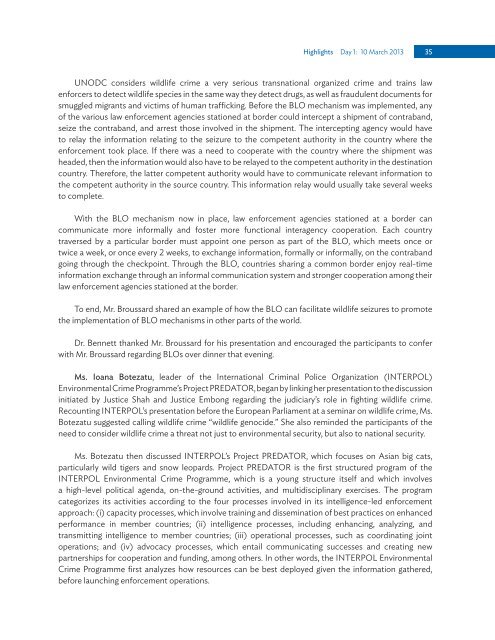ETEE7
ETEE7
ETEE7
You also want an ePaper? Increase the reach of your titles
YUMPU automatically turns print PDFs into web optimized ePapers that Google loves.
Highlights Day 1: 10 March 2013 35<br />
UNODC considers wildlife crime a very serious transnational organized crime and trains law<br />
enforcers to detect wildlife species in the same way they detect drugs, as well as fraudulent documents for<br />
smuggled migrants and victims of human trafficking. Before the BLO mechanism was implemented, any<br />
of the various law enforcement agencies stationed at border could intercept a shipment of contraband,<br />
seize the contraband, and arrest those involved in the shipment. The intercepting agency would have<br />
to relay the information relating to the seizure to the competent authority in the country where the<br />
enforcement took place. If there was a need to cooperate with the country where the shipment was<br />
headed, then the information would also have to be relayed to the competent authority in the destination<br />
country. Therefore, the latter competent authority would have to communicate relevant information to<br />
the competent authority in the source country. This information relay would usually take several weeks<br />
to complete.<br />
With the BLO mechanism now in place, law enforcement agencies stationed at a border can<br />
communicate more informally and foster more functional interagency cooperation. Each country<br />
traversed by a particular border must appoint one person as part of the BLO, which meets once or<br />
twice a week, or once every 2 weeks, to exchange information, formally or informally, on the contraband<br />
going through the checkpoint. Through the BLO, countries sharing a common border enjoy real-time<br />
information exchange through an informal communication system and stronger cooperation among their<br />
law enforcement agencies stationed at the border.<br />
To end, Mr. Broussard shared an example of how the BLO can facilitate wildlife seizures to promote<br />
the implementation of BLO mechanisms in other parts of the world.<br />
Dr. Bennett thanked Mr. Broussard for his presentation and encouraged the participants to confer<br />
with Mr. Broussard regarding BLOs over dinner that evening.<br />
Ms. Ioana Botezatu, leader of the International Criminal Police Organization (INTERPOL)<br />
Environmental Crime Programme’s Project PREDATOR, began by linking her presentation to the discussion<br />
initiated by Justice Shah and Justice Embong regarding the judiciary’s role in fighting wildlife crime.<br />
Recounting INTERPOL’s presentation before the European Parliament at a seminar on wildlife crime, Ms.<br />
Botezatu suggested calling wildlife crime “wildlife genocide.” She also reminded the participants of the<br />
need to consider wildlife crime a threat not just to environmental security, but also to national security.<br />
Ms. Botezatu then discussed INTERPOL’s Project PREDATOR, which focuses on Asian big cats,<br />
particularly wild tigers and snow leopards. Project PREDATOR is the first structured program of the<br />
INTERPOL Environmental Crime Programme, which is a young structure itself and which involves<br />
a high-level political agenda, on-the-ground activities, and multidisciplinary exercises. The program<br />
categorizes its activities according to the four processes involved in its intelligence-led enforcement<br />
approach: (i) capacity processes, which involve training and dissemination of best practices on enhanced<br />
performance in member countries; (ii) intelligence processes, including enhancing, analyzing, and<br />
transmitting intelligence to member countries; (iii) operational processes, such as coordinating joint<br />
operations; and (iv) advocacy processes, which entail communicating successes and creating new<br />
partnerships for cooperation and funding, among others. In other words, the INTERPOL Environmental<br />
Crime Programme first analyzes how resources can be best deployed given the information gathered,<br />
before launching enforcement operations.





